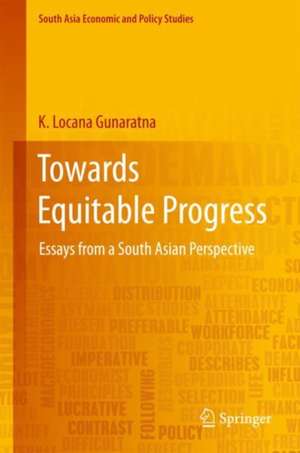Towards Equitable Progress: Essays from a South Asian Perspective: South Asia Economic and Policy Studies
Autor K. Locana Gunaratnaen Limba Engleză Hardback – 13 iun 2018
Preț: 576.22 lei
Preț vechi: 826.02 lei
-30% Nou
Puncte Express: 864
Preț estimativ în valută:
110.27€ • 115.95$ • 91.11£
110.27€ • 115.95$ • 91.11£
Carte indisponibilă temporar
Doresc să fiu notificat când acest titlu va fi disponibil:
Se trimite...
Preluare comenzi: 021 569.72.76
Specificații
ISBN-13: 9789811089220
ISBN-10: 9811089221
Pagini: 175
Ilustrații: XIII, 167 p. 43 illus., 38 illus. in color.
Dimensiuni: 155 x 235 mm
Greutate: 0.44 kg
Ediția:1st ed. 2018
Editura: Springer Nature Singapore
Colecția Springer
Seria South Asia Economic and Policy Studies
Locul publicării:Singapore, Singapore
ISBN-10: 9811089221
Pagini: 175
Ilustrații: XIII, 167 p. 43 illus., 38 illus. in color.
Dimensiuni: 155 x 235 mm
Greutate: 0.44 kg
Ediția:1st ed. 2018
Editura: Springer Nature Singapore
Colecția Springer
Seria South Asia Economic and Policy Studies
Locul publicării:Singapore, Singapore
Cuprins
Part 1: Basic Concerns.- Chapter 1. Development: the Concept.- Chapter 2. Sustainable Development.- Chapter 3. Science, Ethics and Development.- Chapter 4. Climate Change: the Facts.- Part 2: Spatial Concerns.- Chapter 5. Managing Climate Change.- Chapter 6. Managing Urbanization.- Chapter 7. Urban Primacy.- Chapter 8. Conserving Cultural Heritage Sites.- Chapter 9. A National Spatial Policy.- Part 3: Conclusions.- Chapter 10 Summary of Conclusions.-Chapter 11. Sustainable Development.
Notă biografică
Dr. K. Locana Gunaratna is a Fellow of The National Academy of Sciences of Sri Lanka. He is an architect trained at the AA School in London who received his Master’s in City Planning from Harvard University and his PhD from the University of Colombo. He has led many professional associations including the National Academy of Sciences of Sri Lanka, the Institute of Town Planners Sri Lanka, and the Sri Lanka Institute of Architects. Presently, he is a partner at Gunaratna Associates, Chartered Architects, Engineers and Planning Consultants, Colombo, where he uses his extensive experience working with the government in areas such as the Ministry of Urban Development and Mahaweli Development Board. His research focuses on urban spaces and development in Sri Lanka, a topic on which he has written extensively. His publications include the books Spatial Concerns in Development: A Sri Lankan Perspective and Shelter in Sri Lanka: 1978–1991.
Textul de pe ultima copertă
This book gathers a collection of essays presented from the perspective of a spatial planner whose working life has been immersed in South Asia. It concerns some of the serious challenges that need to be confronted in the South Asian context, including the externalities and ethical concerns that arise in the process of development. The mid-20th century saw a considerable focus in the West on assisting those countries emerging from European colonial domination. Theories were propounded and international agencies established to facilitate a process called ‘development’ in these countries. However, even after six decades of extraordinary expenditures and effort, millions among the targeted populations remain illiterate, live in abject poverty, and are the most vulnerable groups to external disasters, debilitating diseases and untimely death. In addition, the book reveals the theoretical inadequacies that negatively impact ongoing development efforts. Lastly, it identifies an available alternative set of science-based approaches that could facilitate the serious pursuit of equitable progress in South Asia and potentially also in other low and middle income countries.
Caracteristici
Reviews and challenges the long held concept of ‘development’ as being the applicable approach to achieve equitable progress in low and middle income countries Identifies a set of science-based theories from the discipline of Spatial Economics to deal with rapid urbanization in South Asia, as an alternative to current approaches Discovers the cultural roots underlying the current ‘ecological crisis’, which disproportionately affect vulnerable groups in low and middle income countries Presents a case study of a National Spatial Policy while highlighting the need for an ethical code to achieve equitable socio-economic progress









